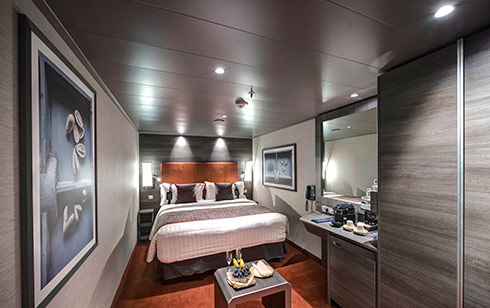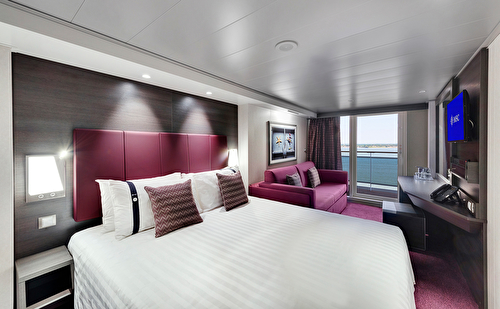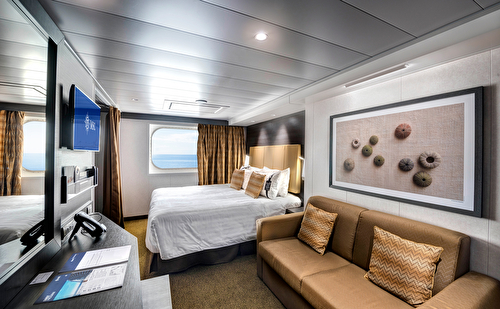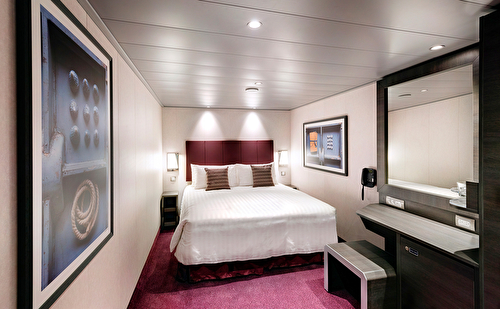Roundtrip Bridgetown
- 17 Feb ‘25
- 14 nights
- Departing from Bridgetown
- MSC Virtuosa
-
Inside price fromCall for price
-
Outside price fromCall for price
-
Balcony price fromCall for price
-
Suite price fromCall for price
INCLUDED WITH YOUR CRUISE
YOUR ITINERARY
Bridgetown, Barbados - Kingstown - Saint Georges, Grenada - Fort De France - Pointe à Pitre - Roadtown - Philipsburg, St Maarten - Basseterre - St John s, Antigua, Caribbean - Fort De France - Pointe à Pitre - Bridgetown, Barbados
When you arrive in Barbados on an MSC Caribbean and Antill...
When you arrive in Barbados on an MSC Caribbean and Antilles cruise, begin your exploration with the capital, Bridgetown. There are many attractions in this small Caribbean city, but by all means pause to admire its many colonial buildings, the Parliament Building and the statue of Lord Nelson standing in what is currently called the National Heroes Square.
Barbados has retained somewhat of a British feel, with its place names, cricket, horse-racing and polo, Anglican parish churches and even a hilly district known as Scotland. But the Britishness can be exaggerated, for this is a distinctly West Indian country, covered by a patch-work of sugarcane fields and dotted with tiny rum shops.
The Garrison Historic Area, a UNESCO World Heritage Site with magnificent 18th- and 19th-century buildings, is a must-see stop, featuring one of the world’s finest collection of cannons. It also includes the George Washington House, where the American patriot spent six weeks of his life.
The current St. John’s Church, in the eastern parish of the same name, is the fifth reconstruction of the oldest local church, in Barbadian Gothic style. Perched on a cliff 800 feet above the sea, it dates back to 1836. Its interior hosts a sculpture by 18th-century British artist Richard Westmacott, while its churchyard contains the tomb of Ferdinando Paleologus, a direct descendant of the brother of Constantine XI, the last Byzantine emperor.
Book an MSC excursion to discover the island’s history at the Barbados Museum and Historical Society in the St. Michael neighbourhood. And tour Sunbury Plantation House, located in the tranquil St. Philip countryside. Dating back to 1650, it’s a living monument to plantation life and a bygone era.
Harrison’s Cave, in St. Thomas district, is a wonder of nature with its stalactites, stalagmites, streams, lakes and waterfalls. In one of the caverns, the play of light on the rocks is so in-tense that it has been nicknamed “The Crystal Room”.
For some fun at the beach, head to Pirates Cove, one of the best beaches on Barbados. Featuring palm trees and chickee huts, white sand and crystal-clear water, it’s the perfect place to relax, just a stone’s throw from Bridgetown.
If you’re brave enough to dive into the deep, set out on an MSC excursion inside a real submarine, the Atlantis, to explore the coral reef and discover the beauty that the depths reveal.
With its yacht-filled harbours, stunning beaches, volcani...
With its yacht-filled harbours, stunning beaches, volcanic backdrops and crystalline turquoise waters, it’s easy to see why the unparalleled natural beauty of St. Vincent and the Grenadines has long attracted sailors, adventurers and the rich and famous, and why it was chosen as the primary filming site for the “Pirates of the Caribbean” trilogy.
Located in the Lesser Antilles, the archipelago of St. Vincent and the Grenadines comprises 32 is-lands and cays, only 9 of which are inhabited. St. Vincent, the largest island in the chain, is home to Kingstown, the capital.
Once you arrive on an MSC Caribbean and Antilles cruise to Kingstown, you will visit Fort Charlotte, a British garrison named in honour of the wife of King George III. Built in 1806, it housed 600 troops in its heyday. Some 30 cannons are still visible today at the fort, where a number of paintings charting the history of the Black Carib people are showcased. From its summit, enjoy fantastic views of the archipelago; on a clear day, Grenada can be seen 90 miles to the south through binoculars.
Explore the St. Vincent and the Grenadines Botanic Gardens, one of the oldest botanical gardens in the Western Hemisphere, on an MSC excursion. Established in the mid-18th century, the gardens played a critical role in the colonization of not just St. Vincent, but also other islands in the West Indies. They helped introduce, establish and distribute plants upon which the future economies and food supplies of most islands became based. These beautiful gardens are home to a wide variety of tropical and medicinal plants, as well as numerous bird species, including the rare St. Vincent parrot. For other opportunities to spot the indigenous parrot species, head on an MSC excursion to Parrot Lookout on the Vermont Nature Trail in the dense rainforest. The guided hike takes you through cultivated fields and forest plantations in the verdant Vermont Valley.
St. Vincent has had a long tradition of cultivating sugarcane. On yet another MSC excursion, learn the history of Black Point – a tunnel dug during the height of the slave trade that was key in the transport of molasses used for making rum. Afterwards, you’ll enjoy a guided tour and tasting at the rum distillery in Georgetown to discover how molasses is distilled into one of the strongest nips of rum in the Caribbean.
“Pirates of the Caribbean” buffs won’t want to miss one of several MSC excursions that take you through the sites on the island where famous scenes were filmed. Visit the village of Wallilabou, board the Scaramouche, a traditional West Indian schooner for a pirate party, or kayak to the so-called Bat Cave near Byahut Cove. The cave is home to a noisy bat colony, and you can enjoy some swimming or snorkelling at the cove and experience the amazing marine life found around the reef. Accessible only by sea, the cove is one of the locations where the “Pirates of the Caribbean” films were shot.
For something special, cruise on a catamaran to see the beguiling coastline of the Bequia, the second largest island in the Grenadines. Catch views of a private community called Moonhole, known for a way of life that seeks harmony with nature and with homes built directly into the landscape, most with neither windows nor doors. Move on to Petite Nevis, a spot where signs of whaling history are still visible and enjoy views of the neighbouring private isle of Mustique, famed for drawing a wealthy clientele that includes members of the British royal family.
Scents of spices such as cloves, cinnamon and nutmeg waf...
Scents of spices such as cloves, cinnamon and nutmeg waft through the air as you arrive on MSC Caribbean and Antilles cruise to St. George’s, the capital of the island of Grenada. Nicknamed the “Spice Island” for its agriculture, Grenada’s symbol is the nutmeg, the island’s most famous product, which also appears on the nation’s flag.
Originally colonized by the French in the 1600s, who wiped out the native Carib peoples during conflicts, Grenada was captured by the British in 1762 and remained under British rule until its independence in 1974.
St. George’s offers many attractions starting with its beautiful views, botanical gardens, parks and heavenly beaches, most notably the Grand Anse Beach nearby.
Start your journey with a guided walk on an MSC excursion through the capital’s winding maze of streets from the Carenage, the horseshoe-shaped harbour, with its lively waterfront promenade. Gaze at picturesque 19th-century pastel-coloured Creole houses made of brick and stone with red-tile roofs made from ship ballasts.
Get a first-hand look at the wonderful palette of spices and scents of the island on an MSC excursion that stops at Dougaldston Estate. At this rustic, 300-year-old cocoa plantation in Gouyave, discover what drying trays for spices and cacao look like and learn how these spices are processed from seed pods, or how cinnamon is harvested from the bark of a tree. From there, proceed to an old-fashioned nutmeg cooperative plant where the work is done by hand.
Grenada features a host of beautiful waterfalls, the most spectacular of which are Annandale Falls, about 7 miles from St. George’s. Hidden by a grotto of dense vegetation in the mountains, the waterfall cascades 30 feet down into the midst of leaves and branches, creating a natural pool where you can swim.
For a throw-back to Grenada’s past, hop on a Creole bus on a guided MSC excursion along a labyrinth of steep roads to higher elevations. Enjoy sumptuous panoramas from the 18th-century forts of Fort George and Fort Frederick, nicknamed “The Backward Facing Fort,” for the cannons facing the land and not the sea.
Thanks in large part to its French and West Indian influence...
Thanks in large part to its French and West Indian influences, Martinique, a lush mountainous island in the Lesser Antilles with its dormant Mount Pelée volcano in the backdrop, exudes a cosmopolitan flair with a sophisticated culinary and cultural scene that draws travellers not only to its natural wonders, beautiful bays and beaches, but also to its heart at Fort-de-France, the capital. While French is the official language, most islanders also speak Antillean Creole. As part of the European Union, the island uses the euro as its currency.
When you arrive on an MSC Caribbean and Antilles cruise in Fort-de-France, you immediately notice the island’s steep hills, colourful colonial architecture, ornate balconies and tropical flowers. Book an MSC excursion to the Balata Cathedral, a miniature replica of the Sacré-Coeur in Montmartre, Paris, which offers a spectacular view of Fort-de-France and the bay.
Before Martinique came to be known by its current name, it was once called Madinina, the island of flowers. At Balata Botanical Gardens, discover 300 types of palm trees, take in views from the garden’s suspension bridge and enjoy the tropical flowers in bloom across 16 acres of lush landscape.
Or try the island’s best rum distilleries. MSC excursions will take you to the Depaz Distillery, in business since 1651, or the St. James Rum Distillery & Museum, where you will learn about the process of making rum and taste the traditional Rhum Agricole, made by using freshly squeezed sugarcane juice rather than the conventional molasses.
Afterwards, visit the ruins of the theatre in St. Pierre, the former cultural capital of Martinique that was tragically destroyed by the 1902 eruption of Mount Pelée. The modern-day town of St. Pierre is France’s 101st “City of Art and History.”
When you arrive on an MSC Caribbean and Antilles cr...
When you arrive on an MSC Caribbean and Antilles cruise in Pointe-à-Pitre, Guadeloupe, you will discover a French gem in the Southern Caribbean, or as native islanders called it, “Karukera,” the “island of beautiful waters.” Guadeloupe’s Creole culture and cuisine are a melange of many influences, including French, African, Indian and East Asian.
Take a scenic MSC excursion to the Guadeloupe National Park, designated a World Biosphere Reserve by UNESCO. Located in the south of Basse-Terre, the park has one of the most beautiful forests in the Caribbean and the highest peak on the island, the Soufrière volcano. Make your way to the three gorgeous waterfalls of Carbet on the lower slopes of La Soufrière. The second waterfall, about 360 feet in height, can be admired from a suspended bridge. Beautiful as they are, the waterfalls are among the most visited sites on Guadeloupe.
The Valombreuse botanical garden is a must-see for those who love gardens, and with 500 species in its collection, not many other gardens in the world can claim to be its equal. Tucked in between the mountains and the sea, it is a riot of tropical plants and flowers and home to many birds, including flower-loving hummingbirds and peacocks.
Head along the southern coast of Grande Terre on a sightseeing MSC excursion to St. Anne, a lovely fishing village with seafront promenade, then continue to visit the much-photographed Pointe des Châteaux, an incredible rock formation sculpted by the wind, followed by a stop in Morne-à-L’Eau, a town noted for its artistic cemetery with black-and-white checkerboard tombs.
You can also slip away on a catamaran on another excursion from Pointe-à-Pitre to the uninhabited islet of Gosier, a tiny gem calling out to you with its lush foliage, white sandy shores, a charming diminutive lighthouse and the intense blue of the sea.
As you arrive on an MSC Caribbean and Antilles cruise in Tor...
As you arrive on an MSC Caribbean and Antilles cruise in Tortola, the largest of the British Virgin Islands, it’s easy to see why pirates took refuge here among the hidden coves and sheltered bays, lush green mountains and powder-white sandy beaches.
Today, its beauty continues to draw attention; Road Town, BVI’s capital, is a haven for yacht chartering, upscale tourism and offshore finance. You recognize Dutch and English colonial influences from a bygone era dominated by large sugarcane plantations built on the backs of enslaved African labour. Main Street, Road Town’s main shopping district, features several historical landmarks including the Post Office, built in the mid-1800s, St. George’s Anglican Church, Britannic Hall and the Virgin Islands’ Folk Museum. Despite being a British protectorate, the U.S. dollar is used as Tortola’s main currency.
The best way to discover Tortola is on an MSC excursion. Take a panoramic island bus tour through Road Town and the charming districts of Long Trench and Fahie Hill. Then drive along the dramatic north shoreline to beautiful Cane Garden Bay, where you can take a dip in the inviting, clear water and gaze at the anchored boats that prize this placid bay. Along the way, get your fill of Instagram-worthy vistas of the surrounding islands.
Feeling more adventurous? Book a 4×4 island tour on a safari-style Land Rover to experience the island’s verdant terrain and magnificent views that are well off the beaten track. Enjoy a snorkelling trip on the southern tip of the BVI archipelago at nearby Norman Island, said to have been the inspiration for Robert Louis Stevenson’s classic “Treasure Island” novel. Or let an MSC excursion take you on a pleasant boat ride to the nearby island of Virgin Gorda to visit the stunning beach area known as The Baths, one of the BVI’s most popular sights. Amid the natural beauty, swim, snorkel and see colourful fish, or simply explore the unusual geological formations comprising huge, sea-sculpted granite boulders that line the beach and form tidal pools, tunnels, caves, arches and scenic grottoes.
Offering some of the best vistas in all the Caribbe...
Offering some of the best vistas in all the Caribbean, St. Maarten is the smallest inhabited island in the world shared by two nations – France in the north and the Netherlands in the south. Dubbed the true melting pot of the Caribbean, the 37-square-mile island is home to people of 47 different nationalities and more than 400 restaurants, featuring a hugely diverse variety of cuisine.
The island also has two capitals: Philipsburg on the Dutch side, and Marigot in the French part. Once you arrive on an MSC Caribbean and Antilles cruise in St. Maarten, explore how the two cultures have blended their very distinct characters on one of our MSC excursions.
Your St. Maarten cruise will dock in Philipsburg, founded in 1763 by John Philips, a Scottish captain in the Dutch Navy. Philipsburg, with its pastel-coloured West Indian houses, is known for its duty-free shopping along Front Street, the Great Salt Pond, which once made the island literally “worth its salt,” and attracted the attention of the French, and Fort Willem, built in 1801, with mag-nificent views of the bay and the surrounding islands.
From there, several MSC excursions take you on a hilly drive to the French side of the island to experience Marigot. Originally a fishing village on a swamp for which it was named, Marigot became the capital during the reign of Louis XVI. Fort Louis, which overlooks Marigot Bay and Anguilla, was built in the late 18th century to protect the town’s warehouses of salt, coffee, sugar cane and especially rum from the English. Today, Marigot showcases quaint colourful gingerbread-like houses, tasty sidewalk bistros and a waterfront market selling fruit and vegetables, spices, local meats and fresh fish from Creole huts worth exploring.
For something special, spend the day on the Dutch side of the island at the restored sugar planta-tion at Rockland Estate. Take in a history lesson at the Emilio Wilson Museum or a nature hike and 360-degree views from Sentry Hill. Participate in a hands-on cooking demonstration of authentic local cuisines with lunch at Emilio’s restaurant, in an exclusive Martha Stewart excursion curated for MSC Cruises.
Also at Rockland Estate, thrill seekers can book other MSC excursions on the Flying Dutchman, a fast and furious zip line ride that will have you whizzing down the line at speeds of up to 56 mph (90 km) per hour. Then take the Pirate Sky Ride cable car back up the top to the Crow’s Nest where several platforms encircling the mountain afford panoramic views of the neighbouring islands of Saba, Sint Eustatius, Saint Barthélemy and Anguilla. Then plunge down the mountain on a Schooner Ride inner tube along a specially designed track.
To experience one of the island’s hottest spots and most popular attractions, visit the famous Maho Beach, also called Airplane Beach. Don’t get too comfortable, though. This is because you watch as planes pass only a short distance above your head as they land and take off from Princess Juli-ana Airport’s short runway next door.
An MSC Caribbean and Antilles cruise to St. Kitts and Nevis wil...
An MSC Caribbean and Antilles cruise to St. Kitts and Nevis will introduce you to the sister volcanic islands of the Caribbean. These islands have been a premier destination for elite tourists for more than 200 years and served as a haven for European nobility in the 19th and 20th centuries.
Basseterre, founded by the French in 1625, became the capital of St. Kitts in 1727, when the Eng-lish took over the island. It remained under British rule until the islands declared their independence in 1983. Throughout the city’s long history, natural disasters and conflicts have afflicted Basseterre; most buildings date from the latter part of the 1800s. A visit to the city’s two cathedrals, St. George’s Anglican Church and the Catholic Cathedral of Immaculate Conception, will appeal to those with a love of history and architecture. On South Square Street, visit Georgian House, one of the better-preserved examples of local 18th-century architecture.
Leaving Basseterre, take a panoramic drive on an MSC excursion to the southeast peninsula en route for a kayaking adventure. Stop at Timothy Hill to enjoy a 360-degree view and a stunning glimpse of the Atlantic and Caribbean nearly side by side; the two bodies of water, each with a dis-tinct appearance, are separated by a spit of land.
If it is adrenaline that quenches your thirst, go off-road on an excursion into the interior of St. Kitts in a specially modified 4×4 Land Rover to explore the lush rainforest and spot shy, green monkeys and other exotic tropical flora and fauna. At a private mountaintop property, 1,000 feet above sea level, enjoy amazing vistas of the rainforest, the coastline, Basseterre, and the neighbouring island of Nevis. Continue your journey through the mountains to the opposite side of the island to explore quaint villages and experience country life.
Learn about wearable art at Romney Manor, home of the world-famous Caribelle Batik. Visit the demonstration room, where acclaimed artists present the wax and dye process of batik making. The Romney Manor Estate encompasses eight acres of historical ruins and features ancient Carib Indian rock drawings and a beautiful botanical garden.
For an excursion unlike any other, book a land-and-sea tour combining train and catamaran. In the first leg of the trip, take in the scenery of St. Kitts on a narrow-gauge train, followed by a catama-ran cruise. The St. Kitts Scenic Railway has been showing visitors the island since 2003, but be-fore that it had transported sugar cane from the fields to the sugar mill in Basseterre for nearly 100 years. At the end of the train journey, board a catamaran to sail the storied western coast of the is-land and take in its gorgeous views.
Fly through the rainforest 25 stories above the ground as you enjoy a spectacular zipline tour over a network of 5 cable lines at the historic Wingfield Estate. Enjoy fantastic panoramic views of Brimstone Hill National Fortress (a UNESCO World Heritage Site), Old Road Village, former sugar estates, the Caribbean Sea and Mount Liamuiga, with its volcano crater ridge marking the highest point in St. Kitts.
“One beach a day,” Antigua’s mott...
“One beach a day,” Antigua’s motto, refers to the island’s 365 beautiful beaches that are famous, secret or even set in volcanic craters. There’s a beach for every lifestyle, for those who are social and ones who seek solitude.
When you arrive on an MSC Caribbean and Antilles cruise in the port of St. John’s, the capital and commercial centre of Antigua and Barbuda, embrace the city’s colourfully vi-brant houses dating to its British colonial period, along with the evocative white baroque towers of St. John’s Cathedral, and the Fort James and Barrington fortresses. The laid-back cosmopolitan city, with its distinctly British flair, is renowned for its shopping at luxury boutiques and high-end shopping malls.
Beyond the city, book an MSC excursion to the historic Nelson’s Dockyard in English Harbour, dedicated to Admiral Horatio Nelson, who was stationed in the West Indies be-tween 1784 and 1787. The shipyard, a UNESCO World Heritage Site, is the largest of Antigua’s National Parks and still remains a working dockyard for numerous yachts and ships. Beautifully restored, its Georgian buildings in wood and stone date to the late 18th and early 19th centuries. Between April and the beginning of May, the Dockyard is the venue for some of the most important sailing regattas in the world, such as Antigua Sailing Week. The excursion continues on to visit the landmark ruins at Shirley Heights of-fering breath-taking vistas of English Harbour.
If an excursion in nature appeals to you, head to Stingray City to swim with friendly southern stingrays in crystal-clear water. Or discover Antigua’s lush rainforest from a bird’s-eye perspective as you navigate through the treetops on a guided canopy tour that will have you walking over a suspension bridge and traversing zip lines over a spectacular gorge.
Thanks in large part to its French and West Indian influen...
Thanks in large part to its French and West Indian influences, Martinique, a lush mountainous island in the Lesser Antilles with its dormant Mount Pelée volcano in the backdrop, exudes a cosmopolitan flair with a sophisticated culinary and cultural scene that draws travellers not only to its natural wonders, beautiful bays and beaches, but also to its heart at Fort-de-France, the capital. While French is the official language, most islanders also speak Antillean Creole. As part of the European Union, the island uses the euro as its currency.
When you arrive on an MSC Caribbean and Antilles cruise in Fort-de-France, you immediately notice the island’s steep hills, colourful colonial architecture, ornate balconies and tropical flowers. Book an MSC excursion to the Balata Cathedral, a miniature replica of the Sacré-Coeur in Montmartre, Paris, which offers a spectacular view of Fort-de-France and the bay.
Before Martinique came to be known by its current name, it was once called Madinina, the island of flowers. At Balata Botanical Gardens, discover 300 types of palm trees, take in views from the garden’s suspension bridge and enjoy the tropical flowers in bloom across 16 acres of lush landscape.
Or try the island’s best rum distilleries. MSC excursions will take you to the Depaz Distillery, in business since 1651, or the St. James Rum Distillery & Museum, where you will learn about the process of making rum and taste the traditional Rhum Agricole, made by using freshly squeezed sugarcane juice rather than the conventional molasses.
Afterwards, visit the ruins of the theatre in St. Pierre, the former cultural capital of Martinique that was tragically destroyed by the 1902 eruption of Mount Pelée. The modern-day town of St. Pierre is France’s 101st “City of Art and History.”
When you arrive on an MSC Caribbean and Antilles cruise in...
When you arrive on an MSC Caribbean and Antilles cruise in Pointe-à-Pitre, Guadeloupe, you will discover a French gem in the Southern Caribbean, or as native islanders called it, “Karukera,” the “island of beautiful waters.” Guadeloupe’s Creole culture and cuisine are a melange of many influences, including French, African, Indian and East Asian.
Take a scenic MSC excursion to the Guadeloupe National Park, designated a World Biosphere Reserve by UNESCO. Located in the south of Basse-Terre, the park has one of the most beautiful forests in the Caribbean and the highest peak on the island, the Soufrière volcano. Make your way to the three gorgeous waterfalls of Carbet on the lower slopes of La Soufrière. The second waterfall, about 360 feet in height, can be admired from a suspended bridge. Beautiful as they are, the waterfalls are among the most visited sites on Guadeloupe.
The Valombreuse botanical garden is a must-see for those who love gardens, and with 500 species in its collection, not many other gardens in the world can claim to be its equal. Tucked in between the mountains and the sea, it is a riot of tropical plants and flowers and home to many birds, including flower-loving hummingbirds and peacocks.
Head along the southern coast of Grande Terre on a sightseeing MSC excursion to St. Anne, a lovely fishing village with seafront promenade, then continue to visit the much-photographed Pointe des Châteaux, an incredible rock formation sculpted by the wind, followed by a stop in Morne-à-L’Eau, a town noted for its artistic cemetery with black-and-white checkerboard tombs.
You can also slip away on a catamaran on another excursion from Pointe-à-Pitre to the uninhabited islet of Gosier, a tiny gem calling out to you with its lush foliage, white sandy shores, a charming diminutive lighthouse and the intense blue of the sea.
When you arrive in Barbados on an MSC Caribbean and...
When you arrive in Barbados on an MSC Caribbean and Antilles cruise, begin your exploration with the capital, Bridgetown. There are many attractions in this small Caribbean city, but by all means pause to admire its many colonial buildings, the Parliament Building and the statue of Lord Nelson standing in what is currently called the National Heroes Square.
Barbados has retained somewhat of a British feel, with its place names, cricket, horse-racing and polo, Anglican parish churches and even a hilly district known as Scotland. But the Britishness can be exaggerated, for this is a distinctly West Indian country, covered by a patch-work of sugarcane fields and dotted with tiny rum shops.
The Garrison Historic Area, a UNESCO World Heritage Site with magnificent 18th- and 19th-century buildings, is a must-see stop, featuring one of the world’s finest collection of cannons. It also includes the George Washington House, where the American patriot spent six weeks of his life.
The current St. John’s Church, in the eastern parish of the same name, is the fifth reconstruction of the oldest local church, in Barbadian Gothic style. Perched on a cliff 800 feet above the sea, it dates back to 1836. Its interior hosts a sculpture by 18th-century British artist Richard Westmacott, while its churchyard contains the tomb of Ferdinando Paleologus, a direct descendant of the brother of Constantine XI, the last Byzantine emperor.
Book an MSC excursion to discover the island’s history at the Barbados Museum and Historical Society in the St. Michael neighbourhood. And tour Sunbury Plantation House, located in the tranquil St. Philip countryside. Dating back to 1650, it’s a living monument to plantation life and a bygone era.
Harrison’s Cave, in St. Thomas district, is a wonder of nature with its stalactites, stalagmites, streams, lakes and waterfalls. In one of the caverns, the play of light on the rocks is so in-tense that it has been nicknamed “The Crystal Room”.
For some fun at the beach, head to Pirates Cove, one of the best beaches on Barbados. Featuring palm trees and chickee huts, white sand and crystal-clear water, it’s the perfect place to relax, just a stone’s throw from Bridgetown.
If you’re brave enough to dive into the deep, set out on an MSC excursion inside a real submarine, the Atlantis, to explore the coral reef and discover the beauty that the depths reveal.
YOUR SHIP - The MSC Virtuosa
MSC Virtuosa’s namesake comes from the word virtuoso, meaning someone highly skilled in any field of activity, and so MSC Virtuosa was named to pay homage to the skill and expertise of the MSC Cruises architects and shipyard partners at Les Chantiers de l’Atlantique who designed and built this innovative class of ships. This new cruise ship is one of the two largest in MSC Cruises’ fleet, along with her sister ship MSC Grandiosa, boasting an impressive array of guest features all coming together in perfect harmony to deliver the ultimate cruise holiday experience.
Description
MSC Virtuosa’s namesake comes from the word virtuoso, meaning someone highly skilled in any field of activity, and so MSC Virtuosa was named to pay homage to the skill and expertise of the MSC Cruises architects and shipyard partners at Les Chantiers de l’Atlantique who designed and built this innovative class of ships. This new cruise ship is one of the two largest in MSC Cruises’ fleet, along with her sister ship MSC Grandiosa, boasting an impressive array of guest features all coming together in perfect harmony to deliver the ultimate cruise holiday experience.
STATEROOMS

suite

balcony

outside


